Expert Tips and Tricks to Build Arm Muscle
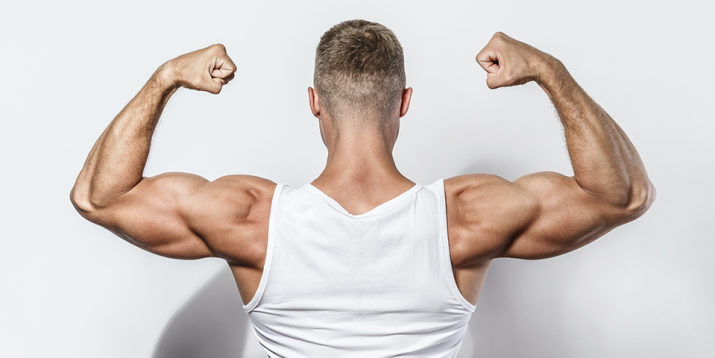
While losing weight often ranks as the top reason many people start working out, building arm muscle is a close second. But well-defined arms don’t happen by chance.
If building arm muscle is your fitness goal, here’s a guide to the best arm exercises, what (and when) you should be eating, how often you should be training, and key tips and tricks from trainers to build arm strength, size, and definition.
How to Build Bigger Arm Muscles: 3 Key Factors for Your Workouts
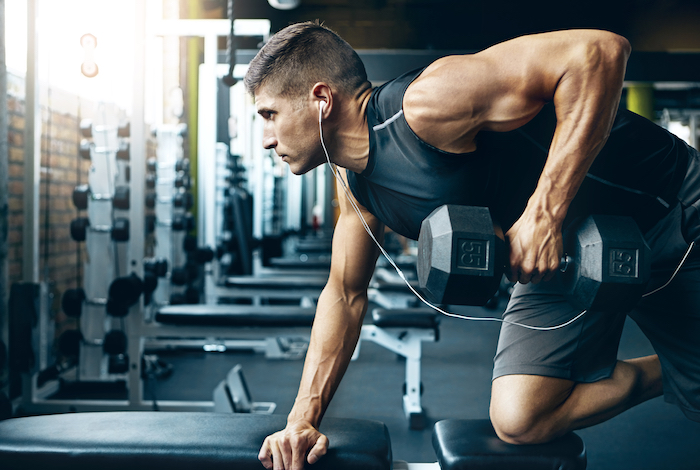
Whether you want to bulk up, get chiseled, or just get toned, your goal for building arm muscles should focus on muscle hypertrophy, a growth and increase in the size of muscle cells.
“Building mass, also known as hypertrophy, is based on breaking down and rebuilding muscle,” says Tony Carvajal, a Certified CrossFit L-1 and L-2 Trainer with RSP Nutrition. “Resistance training is key to hypertrophy and essential for building muscle mass.”
There are three key elements to creating a workout that helps to build arm muscle, explains Dr. Kurt Escobar, an assistant professor of Exercise Physiology at California State University, Long Beach, Co-Director of the Physiology of EXercise and Sport (PEXS) Laboratory, and owner at Biology. Beards. And Barbells.
Those three elements: intensity, volume, and frequency.
1. Intensity
To effectively build arm muscles, research has found that you should focus on lifting moderately heavy weights, about 65 to 85% of your one-repetition maximum.
“If you’re lifting heavy, heavy weights, you’re not going to be able to do enough repetitions to adequately stress the tissue,” Escobar explains.
Think of the difference between powerlifters and bodybuilders: While the former can often lift heavier weights, it’s bodybuilders that have better muscle definition.
2. Volume
The volume, or number of reps you complete of an exercise, is also a key component of building arm muscle.
For hypertrophy training, you want to aim for between 8 to 15 reps so that you’re adequately stressing those muscles, Escobar recommends. “By increasing your volume, you’re able to place more of a mechanical load on the muscles which will allow for more muscle growth to occur.”
While you shouldn’t lift to failure (when you can’t complete another rep), you should lift to fatigue, says Escobar.
3. Frequency
“If you want to build muscle mass, you want to keep the training frequency high,” says Escobar.
“When you lift weights, you turn on your body’s anabolic machinery, or your body’s way of building muscles, for up to two days,” Escobar explains. “So you want to try to turn on that system as frequently as possible. When you do that frequently and consistently, it steadily builds up muscle proteins in that muscle.”
Aim for working out your arms at least two to three times a week in order to regularly turn on your body’s muscle-building capacity.
As for cardio, while it may help you get in overall shape, it won’t help you build arm muscles.
Too much cardio could even work against your goal for more defined arms if your cardio puts you in a caloric deficit.
The Key Arm Muscles to Work
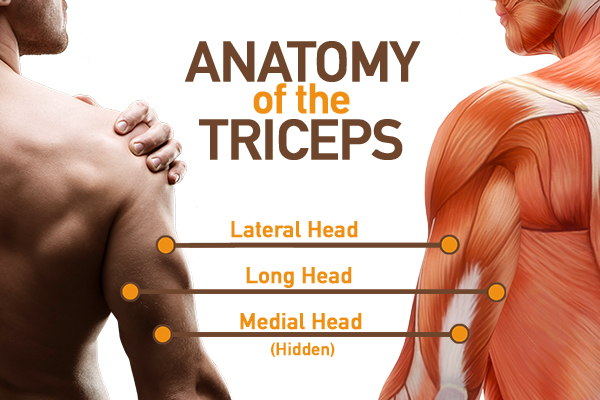
The upper arm is made up of two key muscle groups: the biceps and triceps, says Franklin Antoian, an ACE certified trainer and founder of iBodyFit.
Each muscle group is made up of smaller “heads” — two in the biceps and three in the triceps.
“Working these muscles from multiple angles will help you build muscle quicker and more effectively,” Antoian explains.
The easiest way to activate the different groups is to switch up your wrist position between a supine position (palm up), neutral grip (facing in) and a pronate position (palm facing down).
“While still working the whole muscle overall, adjusting your wrist position will increase the contribution of a particular head,” explains Escobar. “By adding variation, you’ll make sure you’re hitting all the different muscles and insertion points for the bicep and tricep muscles.”
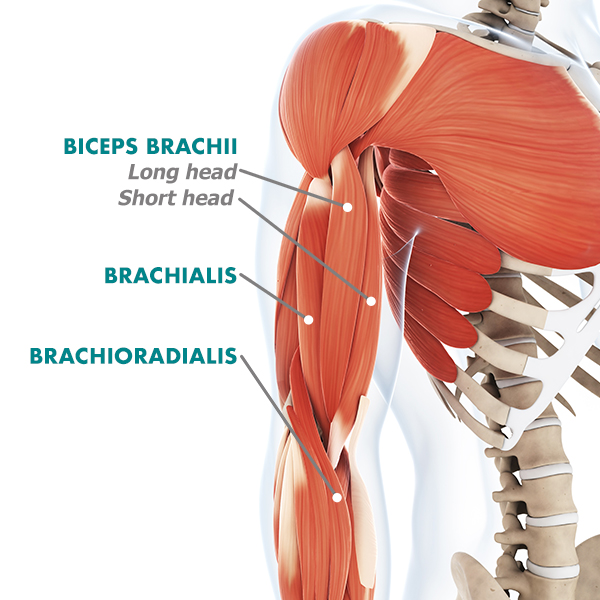
But arguably more importantly, changing your grip means changing what muscles you’re targeting — the biceps might be the most visible arm muscle, but it’s not the most powerful. If you want sleeve-busting arms, you can’t ignore the two other key elbow flexors: the brachialis (the most powerful of the elbow flexors) and the brachioradialis.
So for example, the hammer curl emphasizes the brachialis, while the reverse curl emphasizes the brachioradialis.
The Best Exercises for Building Arm Muscles
Ready to work? Let’s get into Escobar’s favorite exercises for building arm muscles.
“These exercises specifically isolate the muscle groups in the arm. The idea would be to use strict biceps and triceps exercises in order to allow the other muscle groups to recover from their training days.”
Be sure to note the wrist position in each — while each exercise works the entire muscle, the varied wrist position will change the amount of contribution of individual heads.
4 Best Biceps Exercises
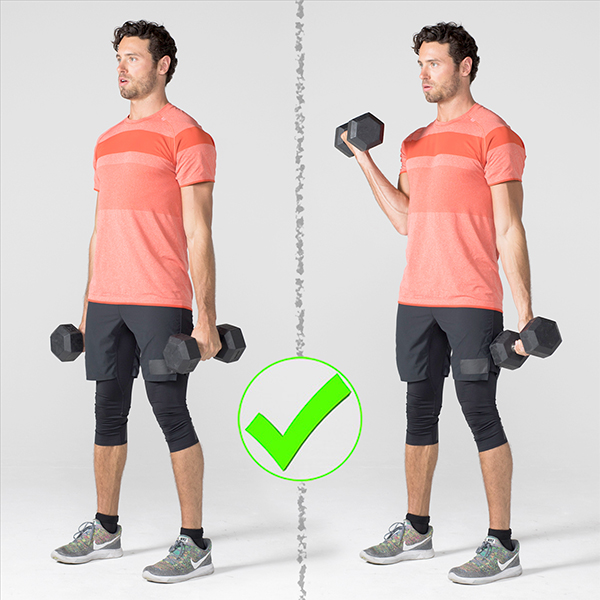
1. Dumbbell neutral to supinated biceps curl: Biceps aid supination, and this will fire up your brachialis.
2. Barbell pronated (reverse grip) bicep curl: Pronated grip increases the amount of work the brachioradialis is doing during the curl; the brachioradialis runs into the forearm so it will help with forearm development.
3. Cross body dumbbell hammer curls: Moving each dumbbell toward the opposite shoulder will develop the brachialis, which will help develop a wider-looking arm.
4. EZ bar preacher curl with close grip: Preacher curl will help isolate the biceps and the other elbow flexors, and the close grip will emphasize more of the long head — what creates the “peak.”
4 Best Triceps Exercises
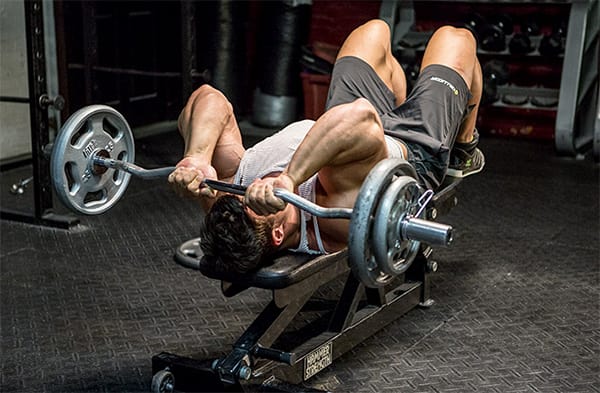
1. Lying triceps extensions (“skull crushers”): This emphasizes the long head of the triceps.
2. Triceps pushdowns with pronated grip (straight bar): This will emphasize the lateral head — the “horseshoe.”
3. Supinated triceps pushdown: The supinated grip will emphasize the medial head.
4. Rope pushdown: This uses a neutral grip which can also emphasize the lateral head.
5 Common Mistakes to Avoid
Once you have a workout plan to build arm muscle and the dietary supports in place to facilitate muscle creation, be sure to avoid these common arm muscle mistake trainers see:
1. Focusing only on the biceps
“Many men neglect their triceps and focus solely on their biceps,” says Antoian. “Triceps make up three-fifths of your arm, so it’s best to train these as well or even more so than your biceps.”
2. Not isolating arms
A number of full-body moves include the biceps and triceps, but if building bigger arm muscles is your goal, be sure to work your arms specifically and deliberately, says Escobar.
3. Over-training without variety
“By doing bicep curls three days a week, you are overbuilding one area and in effect will neglect other areas in the arm.
Make sure to vary the movements and the routine pattern, hitting different muscles and also allowing for recovery,” suggests Carvajal.
In other words, two or three arm workouts a week will help you grow, but not if you’re doing the same workout every time — and not if you’re not giving yourself adequate recovery between sessions.
4. Lifting too light
“Some women may use too light of weights because they believe that heavy weights will make them bulky,” says Antoian.
While lighter weights will help build muscle endurance, but they won’t typically recruit the bigger muscle fibers that have a higher tendency to grow.
(And have you ever met a woman who accidentally got enormous biceps? This does not happen.)
5. Not eating enough
Building muscle requires calories, says Escobar. “If you’re burning more calories than you’re taking in, then you’re not going to be able to build muscle mass.”
What to Eat for Bigger Arm Muscles: The 3 Key Factors to Your Diet
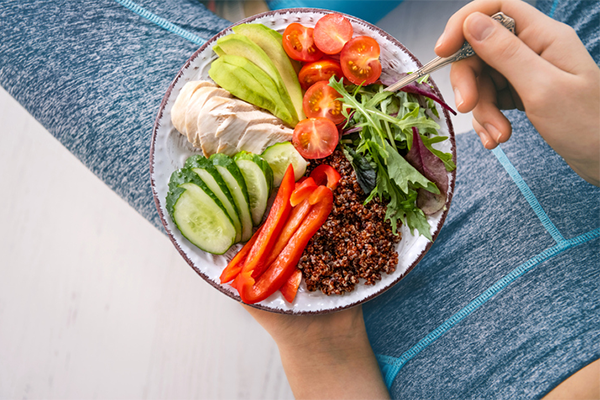
The right nutrition plan is key to facilitating muscle growth. There are three factors to keep in mind when you’re looking to build arm muscle: calories in versus calories out, protein consumption, and timing.
1. Calories
If you want to build a building, you need enough raw materials. The same is true for muscles.
In order to build muscle, you must be consuming more calories than you are expending, explains clinical nutritionist Jacqui Justice, M.S., C.N.S.
“To build arm muscle you need to eat about 500 more calories than your body needs and have it be made up of lean protein, healthy fats, and complex carbs,” says Justice. “All of that can be part of a recovery meal after exercise in the form of a protein shake or full meal eaten within a few hours of working out.”
2. Protein
Want to build arm muscles?
According to Escobar, there is one key ingredient that is the most important to consume: “Protein, protein, protein — especially high-quality protein that has all the necessary amino acids is essential for building muscles.”
3. Timing
When you eat is just as important as what you eat. According to the International Society of Sports Nutrition (ISSN), here are some of the key findings of nutrient timing for weightlifting and building muscle:
- “Meeting the total daily intake of protein, preferably with evenly spaced protein feedings (approximately every 3 hours during the day), should be viewed as a primary area of emphasis for exercising individuals.”
- “Post-exercise ingestion (immediately to 2-hours post) of high-quality protein sources stimulates robust increases in muscle protein synthesis.”
- “Ingesting a 20 to 40 gram protein dose of a high-quality source every 3 to 4 hours appears to most favorably affect muscle protein synthesis rates when compared to other dietary patterns and is associated with improved body composition and performance outcomes.”
